Hello there, rubber-lovers and steel-huggers! Ever wondered what those mystifying characters on the side of your tires signify? Yeah, those that look like your high school algebra problem. Well, you’re in the right place, my friend! Today we’re going to dive into the nitty-gritty of tires, specifically, what 91T, 91S, 91Q, 91H, 91R, 91V, and 91W mean. Buckle up, because we’re about to embark on a journey full of rubber, road, and revelations!
What does 91t, 91s, 91q, 91h, 91r, 91v, 91w mean on a tire?
Ah, the tire hieroglyphics! These combinations are not your tires’ secret codes to each other. They’re actually a system to denote the load index and speed rating of the tires. The number ’91’ represents the load index, i.e., the maximum weight the tire can carry. The letter that follows is the speed rating, which indicates the top speed the tire can handle. A brief overview of these terms:
| Speed Symbol | Speed Rating | Maximum Speed (mph) | Maximum Speed (km/h) |
| 91H | High speed | 130 mph | 210 km/h |
| 91W | Wide speed | 168 mph | 270 km/h |
| 91V | Very high speed | 149 mph | 240 km/h |
| 91T | Touring speed | 118 mph | 190 km/h |
| 91Y | Very high speed (all season) | 186 mph | 300 km/h |
| 91S | Standard speed | 112 mph | 180 km/h |
| 91Q | Special winter tire speed | 99 mph | 160 km/h |
Now, let’s dive into the specifics of each of these tire ratings.
What does 91T mean on a tire?
A tire marked with “91T” is designed to safely carry a maximum load of 615 kg (1356 lbs) at speeds up to 190 km/h (118 mph). This is a common rating for family sedans and vans, as these vehicles are usually not driven at high speeds and do not carry heavy loads.
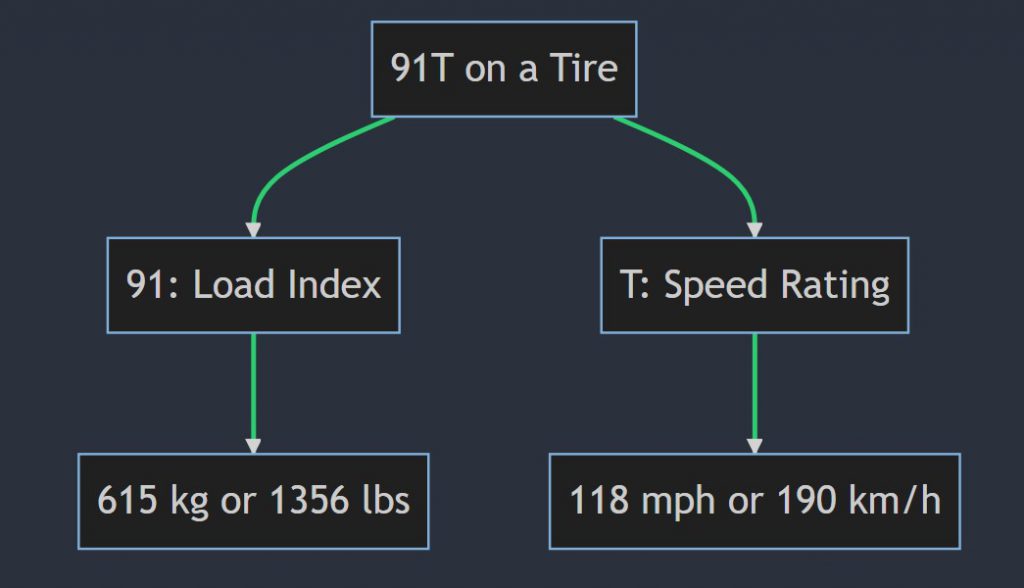
Specifics about 91T Tires
The 91T tires offer a balance between comfort, efficiency, and affordability, ideal for everyday city and highway driving.
Typical Use Cases for 91T Tires
91T tires are generally found on vehicles intended for normal, everyday use – think school runs, grocery shopping, and daily commuting.
Vehicles Suitable for 91T Tires
- Ford Focus
- Honda Accord
- Toyota Camry
- Hyundai Sonata
Precautions when Using 91T Tires
While 91T tires are perfect for routine driving, they might not be the best for off-roading or racing. Exceeding the speed or weight limit can lead to tire damage or even blowouts.
FAQ’s
Q: Can I use 91T tires for a cross-country road trip?
A: Absolutely, as long as you don’t exceed the recommended speed and weight limits.
Q: Can I replace my 91T tires with a higher speed rating?
A: Yes, you can always opt for tires with a higher speed rating. However, they may provide a less comfortable ride.
Q: Is there any difference in fuel efficiency between 91T and higher-rated tires?
A: Higher speed-rated tires can negatively affect fuel efficiency due to their firmer grip and lower rolling resistance.
What does 91S mean on a tire?
Calling all the tire aficionados and the “I-just-want-to-know-enough-to-keep-my-car-safe” folks! Let’s decode the mystery of 91S tires. Like its siblings in the tire alphabet, ’91S’ isn’t the secret password to the tire kingdom, but it’s definitely a crucial key to understanding your tire’s performance.
The ’91’ in 91S is the load index, signifying that this tire can shoulder a hefty 615 kg (or 1356 lbs) per tire. The ‘S’ is the speed rating, denoting that your tire is a sprinter, capable of hitting speeds of up to 180 km/h (112 mph). These ratings make the 91S an ideal choice for family sedans and minivans. Not too fast, not too heavy, just the right balance of everyday performance and reliability.
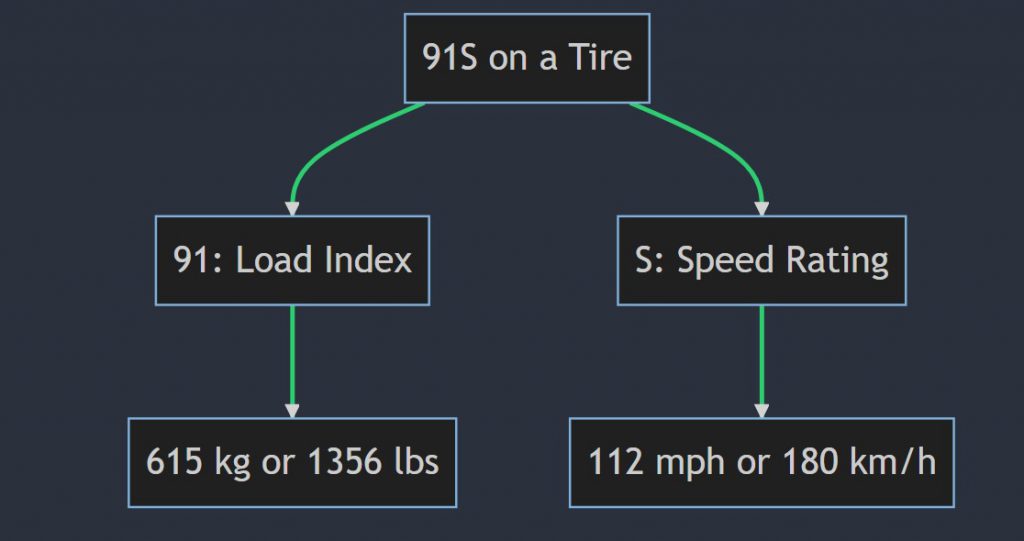
Specifics about 91S Tires
Let’s roll deeper into the specifics of the 91S tires. Like the secret sauce to a delicious burger, understanding these details can elevate your tire game.
Typical Use Cases for 91S Tires
91S tires are ideal for everyday driving, offering a smooth, comfortable ride for family sedans, minivans, and small SUVs.
Vehicles Suitable for 91S Tires
The 91S tires are typically suited for vehicles like:
- Honda Accord
- Toyota Corolla
- Ford Fusion
- Subaru Forester
Just like a good pair of sneakers, the right tires provide the perfect blend of comfort and practicality for your daily commutes and weekend errands.
Precautions when Using 91S Tires
As with any tires, it’s crucial to avoid overloading or over-speeding. So, if you’re planning on hauling a mountain of bricks or zooming like a Formula 1 racer, these might not be your best bet.
FAQ’s
Q: Can I use 91S tires for my SUV?
A: As long as your SUV’s recommended tire specifications match, you sure can!
Q: Can I replace my old 91T tires with 91S?
A: While you can, remember that ‘S’ rated tires have a lower speed capacity compared to ‘T’.
Q: Will using 91S tires affect my vehicle’s fuel efficiency?
A: Not significantly, but remember, keeping your tires well-maintained and inflated can help improve fuel efficiency!
What does 91Q mean on a tire?
’91q Sounds like a cool radio station, right? However, in the tire universe, it stands for something a bit less musical but equally exciting. A tire labeled ’91Q’ can comfortably carry up to 615 kg (or 1356 lbs) while achieving top speeds of 160 km/h (99 mph). It’s no racing champion, but it’s not meant to be. These tires are specifically designed for winter conditions, giving you confidence when tackling snowy and icy roads.
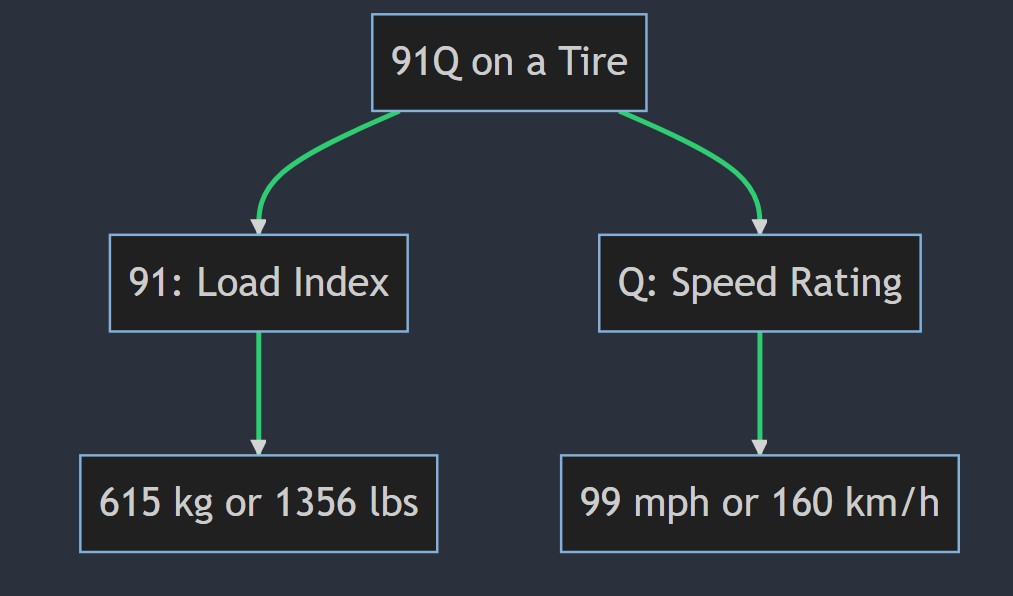
Specifics about 91Q Tires
Just like a sturdy pair of winter boots, let’s slip into the details of the 91Q tires.
Typical Use Cases for 91Q Tires
91Q tires are your winter warriors, designed to perform optimally in cold conditions and provide superior grip on slippery roads.
Vehicles Suitable for 91Q Tires
- Subaru Outback
- Honda CR-V
- Toyota RAV4
- Ford Escape
Remember, these vehicles are examples, so always check your vehicle’s tire requirements.
Precautions when Using 91Q Tires
Although they’re fantastic for winter conditions, using 91Q tires in warmer weather or at high speeds can lead to faster wear.
FAQ’s
Q: Can I use 91Q tires all year round?
A: It’s not recommended as they’re specially designed for winter conditions and might wear out quickly in warmer climates.
Q: Is it safe to use 91Q tires if I live in an area where it snows occasionally?
A: Absolutely, as long as you switch back to your regular tires once the season changes.
Q: Are 91Q tires only for 4WD vehicles?
A: Not at all! They can be used on any vehicle that requires this specification.
What does 91H mean on a tire?
And now, ladies and gentlemen, enter the 91H! A tire marked ’91H’ can carry up to 615 kg (or 1356 lbs) at speeds of up to 210 km/h (130 mph). This tire is like your dependable buddy, balancing performance and comfort for a wide range of vehicles.
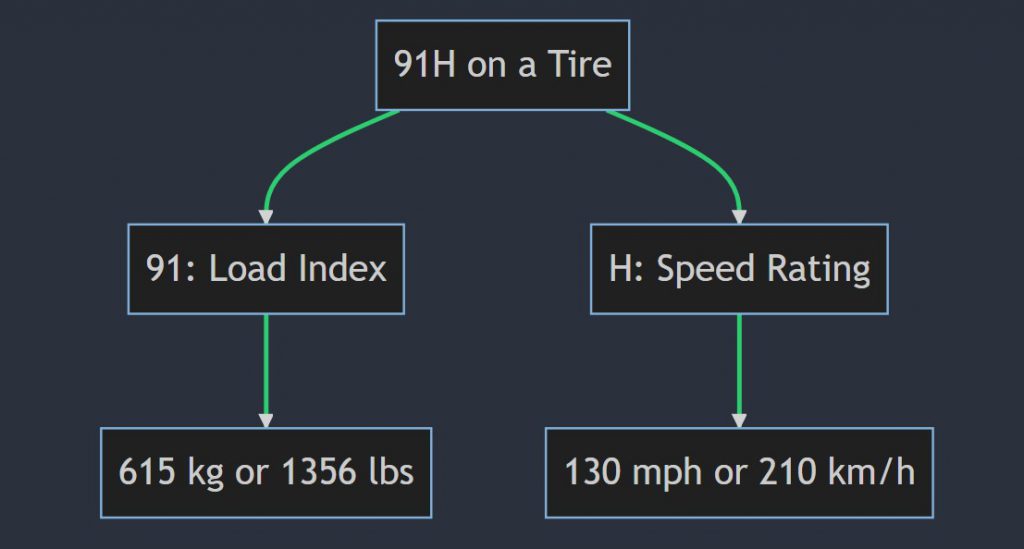
Specifics about 91H Tires
Let’s venture further into the realm of 91H tires.
Typical Use Cases for 91H Tires
91H tires are the jack-of-all-trades in the tire world, providing reliable performance for regular commuting, highway driving, and occasional long trips.
Vehicles Suitable for 91H Tires
Vehicles like:
- Hyundai Sonata
- BMW 3 Series
- Honda Civic
- Chevrolet Malibu
are excellent contenders for sporting a set of 91H tires.
Precautions when Using 91H Tires
Ensure you’re not pushing these tires beyond their speed limit and that you’re not overloading them. Regular maintenance is crucial for longevity.
FAQ’s
Q: Can I replace my 91T tires with 91H?
A: Absolutely, 91H tires have a higher speed rating and can be used as a replacement for 91T.
Q: Are 91H tires good for long road trips?
A: Sure, as long as you’re not planning to hit its speed limit for prolonged periods.
Q: Do 91H tires offer a comfortable ride?
A: They sure do! They’re designed to provide a balance of comfort and performance.
What does 91R mean on a tire?
All right, tire enthusiasts and curious souls, let’s zoom in on the ’91R’ tire code. ’91R’ sounds like a secret code to a tire treasure, but what it does is reveal crucial information about your tire’s capacity. The ’91’ here is the load index, suggesting that this tire can bear a maximum load of 615 kg (or 1356 lbs) per tire. The ‘R’ stands for Radial, indicating the tire’s construction type.
Most modern tires are Radial tires, meaning their internal structure consists of layers running radially across the tire. This construction enhances the tire’s strength, longevity, and fuel efficiency. Buckle up as we dive deeper into the specifics of these trusty road companions.
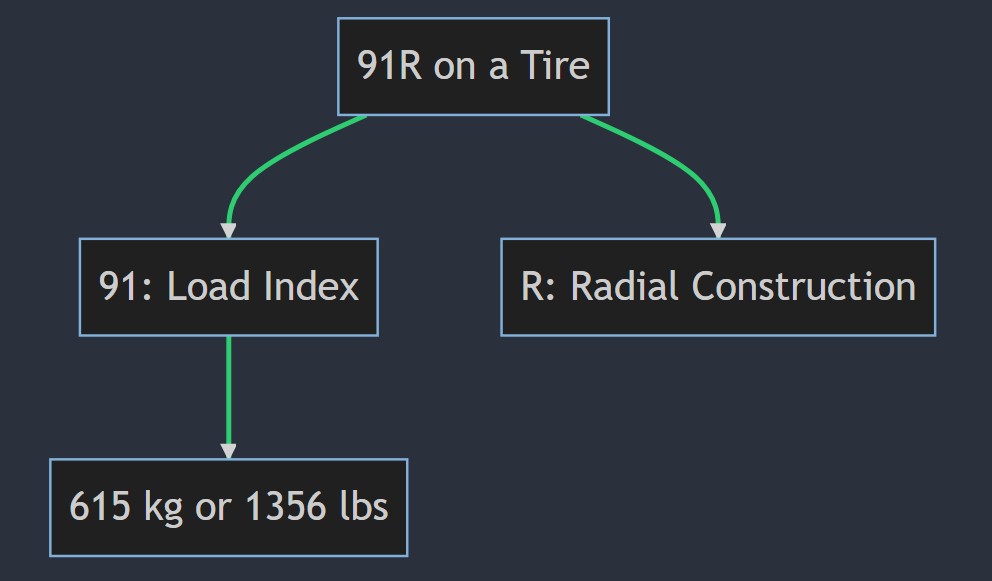
Specifics about 91R Tires
Now that we’ve gotten a brief introduction to the 91R tire, let’s unravel its unique features and characteristics.
Typical Use Cases for 91R Tires
91R tires are great all-rounders, suitable for general driving scenarios, including daily commutes, long drives, and road trips.
Vehicles Suitable for 91R Tires
91R tires are quite versatile and find their place in a variety of vehicles such as:
- Toyota Camry
- Ford Focus
- Honda Accord
- Chevrolet Cruze
Remember, it’s always important to match your vehicle’s tire requirements before making a choice.
Precautions when Using 91R Tires
While using 91R tires, ensure not to overload the vehicle. Maintain regular checks for tire pressure and tread depth for optimal performance.
FAQ’s
Q: Can I use 91R tires for a light truck?
A: It depends on the truck’s recommended tire specifications, so always check the manual.
Q: Can I replace my old 91V tires with 91R?
A: While technically possible, ‘V’ rated tires have a higher speed rating. Always check with a professional.
Q: Do 91R tires offer a comfortable ride?
A: Absolutely, their radial construction ensures a smooth and comfortable ride.
What does 91V mean on a tire?
Rolling into the realm of ’91V’ tires, this code tells us the tire can carry up to 615 kg (or 1356 lbs) while reaching speeds up to 240 km/h (149 mph). Yes, you read that right. These tires have got a need for speed, suited for high-performance sedans or sporty crossovers that enjoy flexing their muscles on the open road.
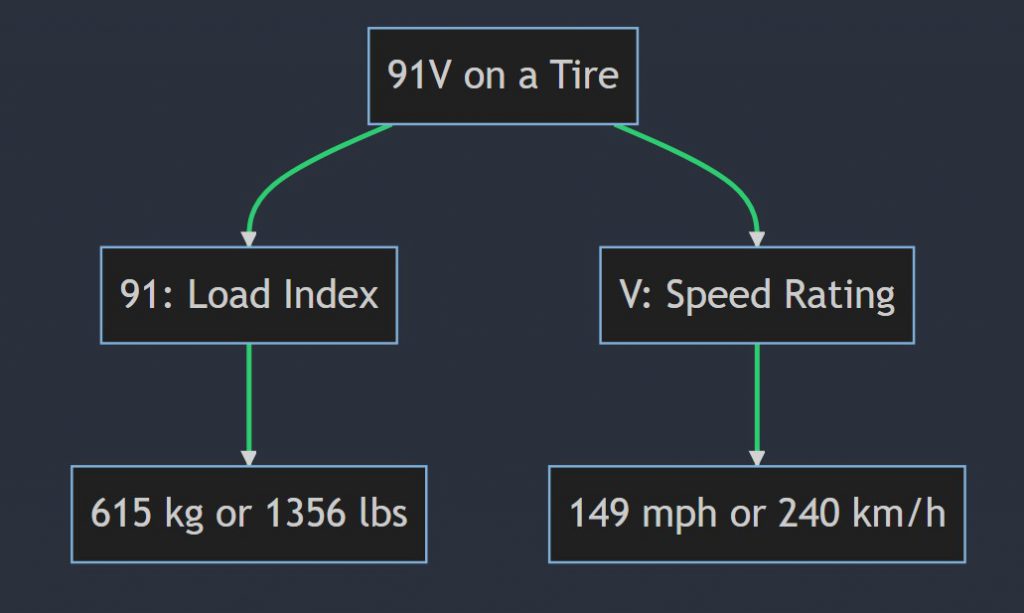
Specifics about 91V Tires
Let’s unravel more about the mighty 91V tires, the speed demons of the tire world.
Typical Use Cases for 91V Tires
91V tires are perfect for higher-speed applications such as highway driving, sporty driving, and even those spontaneous road trips.
Vehicles Suitable for 91V Tires
91V tires are excellent for vehicles like:
- BMW 3 series
- Mercedes-Benz C-Class
- Audi A4
- Ford Mustang
Remember, always check your vehicle’s specific tire requirements before making a selection.
Precautions when Using 91V Tires
Remember, a higher speed rating doesn’t mean you should exceed speed limits. Drive responsibly and ensure regular tire maintenance.
FAQ’s
Q: Can I replace my old 91H tires with 91V?
A: Yes, 91V tires have a higher speed rating, but always check your vehicle’s recommendations.
Q: Are 91V tires suitable for racing?
A: They’re designed for higher speeds, but professional racing requires specialized tires.
Q: Do 91V tires wear out quickly?
A: Not if properly maintained and used within their specifications.
What does 91W mean on a tire?
Last but not least, let’s explore the world of ’91W’ tires. These speedsters are designed to carry up to 615 kg (or 1356 lbs) and reach speeds of up to 270 km/h (168 mph). Designed for performance-oriented vehicles, these tires ensure your car’s performance meets your adrenaline needs.
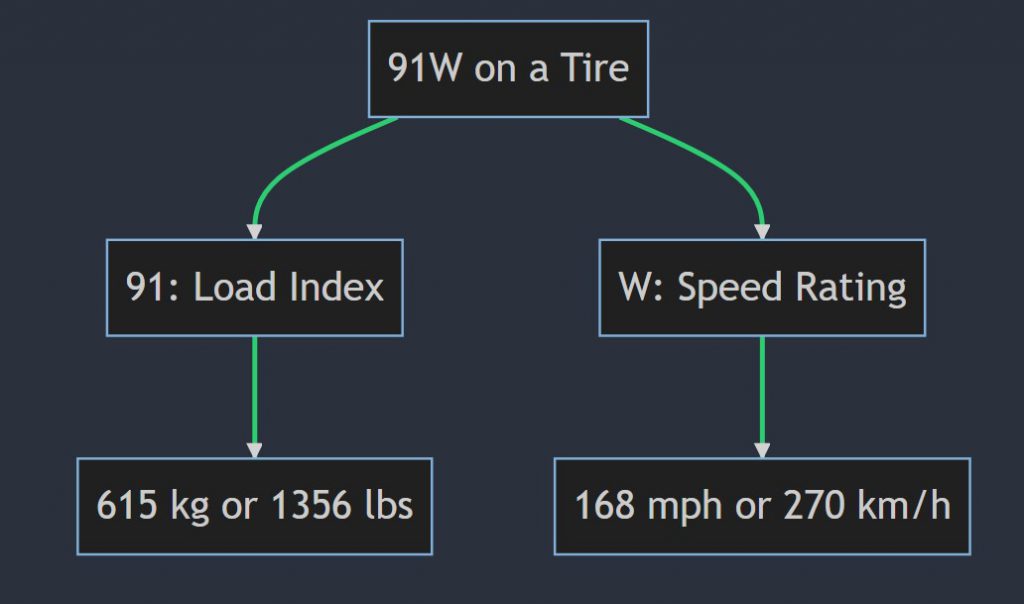
Specifics about 91W Tires
Let’s break down the distinct traits of the swift and reliable 91W tires.
Typical Use Cases for 91W Tires
Perfect for high-speed highway cruising, sporty driving, and covering long distances in style and comfort.
Vehicles Suitable for 91W Tires
Vehicles such as:
- Audi S4
- BMW M3
- Mercedes-Benz E-Class
- Jaguar XE
are well-suited for the speed and performance that 91W tires offer.
Precautions when Using 91W Tires
Keep in mind, high-speed tires require more maintenance. Regularly check tire pressure and tread depth for optimal performance.
FAQ’s
Q: Can I use 91W tires on any car?
A: The vehicle must be compatible with the tire’s specifications. Always check the owner’s manual.
Q: Are 91W tires noisy?
A: They can be slightly noisier due to their performance-oriented design.
Q: Do 91W tires wear out quickly?
A: If properly maintained, they should last as long as other tire categories.
Recap And Summary
To sum it up, understanding tire ratings is crucial for maintaining safety and performance. Each rating is tailored to suit different vehicle types and driving conditions. So, it’s essential to use the correct tires for your vehicle. A mismatch could lead to suboptimal performance or even accidents.
FAQ’s
Q: What does 91V XL mean on a tire?
A: The ‘XL’ in ’91V XL’ stands for ‘Extra Load’. It means that the tire is capable of handling more weight than a standard tire of the same size. The ’91V’ means the tire can carry up to 615 kg (or 1356 lbs) and is rated for speeds up to 149 mph (or 240 km/h).
Q: Which is better, 91H or 91V?
A: Both have their unique strengths. A 91H tire offers a high-speed rating of 130 mph (or 210 km/h), while a 91V tire offers a very high speed rating of 149 mph (or 240 km/h). If you often drive at high speeds, you might consider the 91V. However, both tires are designed to carry the same load, so the “better” choice really depends on your driving needs and habits.
Q: What is 91T or 91H tires?
A: These refer to the load index and speed rating of tires. ’91’ is the load index, indicating that the tire can carry up to 615 kg (or 1356 lbs). ‘T’ and ‘H’ are speed ratings. A 91T tire is rated for speeds up to 118 mph (or 190 km/h), typically used for family sedans and minivans. A 91H tire, on the other hand, is rated for higher speeds up to 130 mph (or 210 km/h), commonly used for sporty sedans and coupes.
Q: 91S vs 91H – what’s the difference?
A: The main difference lies in their speed ratings. 91S tires are rated for speeds up to 112 mph (or 180 km/h), while 91H tires are rated for higher speeds, up to 130 mph (or 210 km/h). Both are capable of carrying the same load, which is up to 615 kg (or 1356 lbs).
Q: 91W vs 91H – what’s the difference?
A: Again, the difference is in the speed rating. A 91H tire is rated for speeds up to 130 mph (or 210 km/h), while a 91W tire has a higher speed rating, allowing for speeds up to 168 mph (or 270 km/h). Both can carry the same load of up to 615 kg (or 1356 lbs).
Final Verdict
Like a good pair of shoes for a sprinter, the right tires for your vehicle can elevate its performance and ensure safety. Remember, the tires are the only parts of your car that touch the road. So, understanding what those cryptic numbers and letters on them mean, can make a world of difference to your driving experience. So, get the right shoes for your car and enjoy the ride!
Alternative Tire Size Codes of Similar Specifications

AR Jeet has been a tire mechanic for over 2years. He has worked on all types of vehicles, from cars and trucks to RVs and ATVs and motorcycles. He has seen it all when it comes to tires, and he knows how to fix them.
AR Jeet is a tire expert, and he is passionate about his work. He loves to help people keep their vehicles running smoothly, and he is always happy to answer any questions that people have about their tires.
If you need help with your tires, or if you just want to learn more about them, then AR Jeet is the man to talk to. He will be happy to help you out, and he will make sure that you get the best possible solution.
He has a blog [Tirespick.com] where he writes about all things tire-related, and he is always happy to help people with their tire needs. Know more about AR Jeet.
